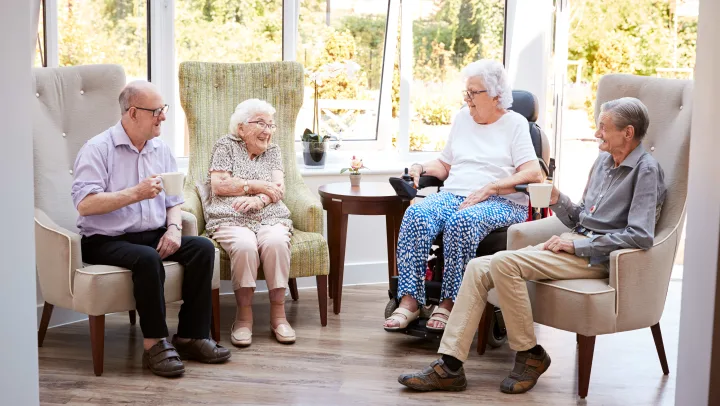Compare Memory Care solutions for families seeking compassionate support.
Compare Memory Care solutions for families seeking compassionate support.
Blog Article
The Relevance of a Comprehensive Program of Treatment in Assisted Living Settings
In helped living setups, the implementation of a detailed program of care is necessary for addressing the multifaceted requirements of residents. By prioritizing individualized care plans and entailing families in the procedure, these programs can substantially boost health and wellness end results and quality of life.
Comprehending Comprehensive Treatment Programs
As aided living facilities remain to progress, recognizing extensive treatment programs comes to be vital for both residents and their households. Comprehensive treatment programs are made to address a broad variety of demands for people residing in assisted living atmospheres, making certain that each resident obtains tailored support that reflects their distinct health and wellness problems and way of life choices.

Additionally, extensive treatment programs stress coordination among numerous carriers, guaranteeing seamless communication in between caretakers, medical personnel, and relative. This integrated technique not only enhances the quality of treatment however also cultivates an encouraging neighborhood environment. Families play an indispensable duty in this procedure, participating in treatment preparation and ongoing conversations to make sure that the local's needs are consistently satisfied. Understanding these programs is essential for making notified decisions regarding care choices and making best use of the top quality of life for locals in nursing home.
Benefits for Homeowners

(Dementia Care Charlotte)One main advantage of thorough care is the enhancement in health results. Normal tracking and worked with treatment aid in the very early discovery and administration of persistent problems, decreasing hospital stays and emergency interventions. Locals benefit from boosted social involvement, as structured activities and programs promote a feeling of area, combatting feelings of seclusion and solitude.
Furthermore, citizens experience boosted satisfaction, understanding that specialist assistance is easily offered ought to they call for aid. This guarantee permits them to concentrate on appreciating their day-to-day tasks and preserving significant partnerships.
Function of Caregivers
Caretakers play a pivotal role in the well-being of residents in assisted living facilities, ensuring that their requirements are met empathy and competence. They work as the primary point of call for homeowners, supplying necessary assistance in daily activities such as bathing, dressing, and drug management. Their existence not just advertises physical wellness however also boosts emotional and social well-being by fostering relationships built on trust and understanding.
In enhancement to supporting daily living tasks, caretakers contribute in keeping track of changes in homeowners' health and wellness and actions. They are educated to recognize refined indications of distress or decrease, allowing timely treatments that can protect against difficulties. Their understanding of each resident's one-of-a-kind history and choices allows them to supply customized treatment, improving the total high quality of life.
Furthermore, caretakers act as supporters for residents, connecting their needs and choices to other health care specialists and family participants. This advocacy is crucial in creating an alternative treatment environment that values the dignity and autonomy of each person. Inevitably, the commitment and ability of caregivers are necessary components of you could try these out a detailed program of treatment, underpinning the success of assisted living settings.
Customizing Care Program
While every resident in assisted living has special needs and preferences, tailoring treatment plans is necessary to delivering effective and individualized assistance. A one-size-fits-all approach to care can neglect essential aspects of private wellness, possibly leading to suboptimal outcomes. Assisted Living. A comprehensive assessment of each local's health and wellness condition, individual background, and way of living selections is extremely important in creating customized treatment methods.
The customization procedure entails cooperation amongst medical care specialists, caretakers, and member of the family. By integrating input from all stakeholders, care strategies can attend to not just medical requirements but also emotional and social factors that add to total lifestyle. Routine reviews and updates to these strategies make certain that they continue to be pertinent as citizens' conditions and preferences evolve with time.
(Dementia Care Charlotte)Furthermore, tailored treatment strategies advertise a feeling of dignity and autonomy among locals, promoting an atmosphere where they really feel valued and appreciated. This individualized strategy not just boosts the effectiveness of treatment but also strengthens the relationship between caregivers and homeowners, producing a helpful neighborhood environment. Eventually, investing in personalized care planning is a cornerstone of providing top quality assisted living services that meet the diverse demands of homeowners.
Enhancing Area Involvement
Structure on the foundation of customized care strategies, boosting area engagement is an important element of enhancing the general experience for citizens in assisted living (Assisted Living). Active engagement in community activities cultivates social links, fights feelings of isolation, and adds to emotional well-being. Promoting chances for citizens to engage in team tasks, such as art classes, gardening, and workout sessions, produces a comprehensive atmosphere that advertises communication and partnership
Moreover, incorporating citizens into the broader area with collaborations with regional companies can give enriching experiences, such as volunteering and going to cultural occasions. This not only aids citizens really feel valued however also reinforces connections with the bordering neighborhood, boosting their sense of belonging.
Furthermore, motivating family participation in community tasks is important. Memory Care. Member of the family can serve as crucial support systems, assisting to bridge the space between citizens and the community. Routine family members events and open discussion forums for discussion foster openness and partnership, making certain that the care setting remains receptive to the demands of all stakeholders
Conclusion
Finally, comprehensive treatment programs in assisted living setups play an important duty in optimizing locals' health. By addressing medical, emotional, and social needs, these programs not only improve top quality of life but likewise promote very early discovery of health problems, lowering the likelihood of hospitalizations. Moreover, the participation of families in care planning strengthens assistance networks, cultivating a sensible and autonomous living environment. Eventually, such programs add substantially to the overall wellness outcomes and contentment of residents.
Report this page